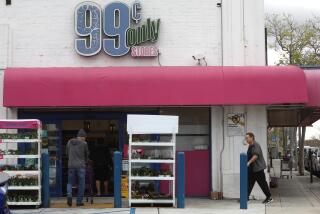Salesmen, Price Dip Cited in Firm’s Crash
LOS ANGELES — Unscrupulous salesmen and an unexpected plunge in diamond prices were the real culprits in the collapse of a Costa Mesa investment and gem-selling company, an attorney representing one of the former owners of Crandall Financial Corp. told a federal jury on Wednesday.
The owners and five employees are on trial in federal court on charges of defrauding about 800 customers, most of them Southern Californians. The customers invested $5.5 million in gems and $3 million in money market funds, according to a grand jury indictment filed in May.
Each defendant faces 12 mail fraud counts for on charges of using deceptive sales techniques and unauthorized use of customer money, according to court records.
Crandall has been closed since September, 1984, when the Securities and Exchange Commission filed a complaint accusing the company with fraud and obtained a federal court order placing it in receivership.
Ronald Allen Smith of Fullerton and his brother, Michael Edward Smith of Fallbrook, were the founders and owners of Crandall. Eight former employees were originally indicted with the Smiths, but three pleaded guilty and have agreed to testify against the Smiths and the others.
In his opening statement, Ronald Smith’s attorney blamed unethical telephone salesmen who used unauthorized sales scripts to mislead investors. Marcus Topel also said a dramatic drop in diamond prices in late 1980 affected customer profits.
“Nobody is sorrier for its (Crandall’s) demise than they (the Smiths) are,” Topel said.
Before founding Crandall, Ronald Smith managed a diamond department at a J.C. Penney Co. store and Michael Smith sold musical instruments, Topel said.
In 1979, the Smith brothers founded Crandall with the owners of John Crandall Jewelers, a retail jewelry chain in Southern California. By 1984, the Smiths were the sole owners of Crandall Financial, according to Topel.
In her opening statement, Assistant U.S. Atty. Sharon McCaslin painted a different picture of the company. She said the Smiths commingled customer money with company money and paid themselves more than $1 million in commissions and bonuses during one 15-month period. She said the government will prove that investors paid inflated prices for the gems they bought from Crandall and were misled about sales commissions.
Salesmen told customers they earned commissions of 6% to 8%, when, in fact, they earned 25% to 42%, McCaslin said.
In July, 1984, when the Smiths learned that the Securities and Exchange Commission was investigating Crandall’s investment programs, they moved to offices in West Covina and started a company called Global Marketing, McCaslin told the jury.
On Wednesday, former Crandall saleswoman Virginia Lukei, testified that not one of her customers made any money on their investments, although she promised them a 36% annual profit.
“It was a lie,” said Lukei, who has already pleaded guilty to one mail-fraud charge stemming from her employment with Crandall in 1983-84. Lukei was one of the 200-300 salespeople working for Crandall, according to court records.
Each of the felony mail fraud counts facing the defendants carries a maximum penalty of five years in prison and a fine of $25,000, McCaslin said.
More to Read
Inside the business of entertainment
The Wide Shot brings you news, analysis and insights on everything from streaming wars to production — and what it all means for the future.
You may occasionally receive promotional content from the Los Angeles Times.








